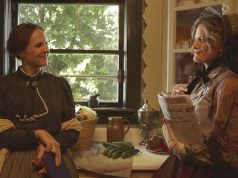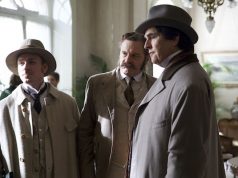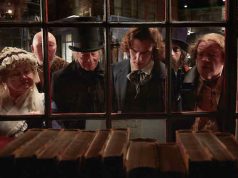“Isn’t she great?” is what talent agent Irving Mansfield (Nathan Lane) keeps saying about his client/wife Jacqueline Susann (Bette Midler), whenever she does something allegedly funny or outrageous. “Isn’t she great?” he’ll say, the ensuing “Eh? Eh?” implied rather than spoken.
And the answer? No. No, she’s not. She’s not great. “Great” is a quality wholly unassociated with Jacqueline Susann. It’s also not a word you’d use to describe the movie. “Unfunny” and “tiresome” spring more readily to mind, as do “unnecessary” and “By the gods, who made me watch this crap?”
“Isn’t She Great” takes place in the ’60s (the movie doesn’t give us specific years, just like it doesn’t bother to flesh out its characters), telling the real-life story of Susann, who wanted nothing more than to be famous, and who got her fame when she wrote “Valley of the Dolls” and other tawdry, poorly written books.
First she fails as an actress, and rightly so, as she is without talent. This does not stop Irving from falling in love with her and thinking he can make her famous, though, and they get married approximately one second after meeting each other. Two seconds later, they have a kid, who is autistic and has to go to a special place for autistic kids. Two seconds after that, Jacqueline has breast cancer. See, all this tragedy, and nothing to show for it! That is, no fame, which is the only thing she actually wants, never mind the family or the happiness.
I don’t know if Jacqueline Susann was actually as shallow as she’s painted in this film. Indeed, I wonder whether it’s possible for any human being to be as shallow as she is in this film. Midler and Lane are a fantastically annoying couple, despite being fairly good actors. Everything is played with so much schmaltz and over-the-top goofiness that you’d think you were watching a skit, rather than a biography.
And the laughs? They ain’t there, Hector. Some things could be funny, if they were played without the sledgehammer style of telegraphing the joke, telling the joke, and then reminding you that a joke was just told. Like when Irving prepares to save Jacqueline from drowning herself in Central Park, very carefully removing his shoes and socks and rolling up his pant legs. That’s a funny idea — taking your time to save someone’s life — but it’s ruined by the fact that the reason Jacqueline’s in the lake in the first place is a stupid, unmotivated one, and the fact that everyone keeps braying their lines like the between-songs banter you hear coming out of fiddle-playing families at the county fair.
The film is so dedicated to its cheesy badness (which goes right down to its sickening musical score) that you’d think it was being done on purpose. Yet someone apparently thought the movie would work as a Jacqueline Susann biography (which I don’t recall asking for, by the way), as it is virtually plot-free. Jackie wants to be famous; she writes a book; she gets famous; the end. That’s how you tell the story of, say, Gandhi or Genghis Khan — someone truly important, where just seeing what happened in their lives is interesting enough. Susann’s life doesn’t happen to have been all that interesting, apparently, and definitely not funny or worth watching a movie about.
D- (; )





